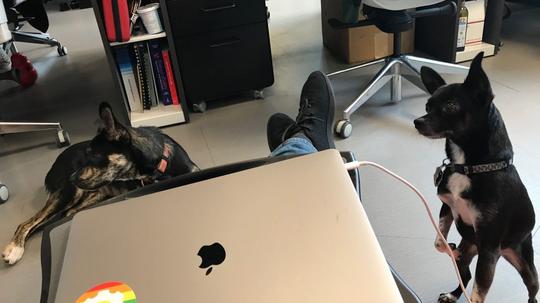
meQuilibrium, the Boston-based stress management platform provider, is housed in a building that doesn’t allow dogs. But that doesn’t stop its employees from bringing them in.
Each day, a French bulldog named Nala is smuggled in through a freight elevator. She’s small enough not to be noticed by the building attendants, and she’s well-behaved enough that her presence hasn’t been a problem for anyone in the meQuilibrium office. On the contrary, the Frenchie brings a little levity to the office—suitable for a company that deals in alleviating workplace stress.
“We all really enjoy her,” said Linda Lewi, a brand strategist at meQuilibrium. “Not all buildings allow dogs, and not all dogs are meant to be at work. But people love their dogs, and their dogs provide immense emotional support.”
Indeed, dogs can be found in an increasing number of workplaces. HBO’s “Silicon Valley” riffed on the trend back in its very first season, where job candidates demanded to know during their interviews if the workplace was dog-friendly—no, not just allowing dogs, but dog-friendly—and pups at work have only become more common since then.
https://www.youtube.com/watch?v=E3kP2A80KIw
In 2017, researchers with the Centers for Disease Control and Prevention and West Virginia University reviewed the impacts of having dogs in the workplace and the considerations made by HR and office managers. In their study, published in the International Journal of Environmental Research and Public Health, they wrote that “empirical evidence supports the notion that dogs may provide social support, improve performance, and increase social interactions.”
Even so, there are possible hazards that dogs can introduce into the workplace. The researchers raise the possibilities of allergies, animal-borne diseases, trip-and-fall dangers and even dog bites. There are a number of ways to limit the risks: surveying employees for allergy information, designating special dog areas separate from working space, requesting that owners bathe their dogs twice a week.
Some workplaces in Boston, like Ginkgo Bioworks and AppNeta, have created special pup play areas. Ginkgo’s managers decided to build out a dog room toward the end of 2017, said Andy Gonzalez, a strategy manager there. It’s a completely separate room, walled with glass and floored with a rubbery material for easy clean-up. If someone brings in a dog, that person is expected to work in the dog room, only leaving their pup’s side for a meeting—and even then, they have to ask a co-worker to watch their pup.
“We put it in place really because we wanted a dog room,” Gonzalez said. “A lot of folks at Ginkgo have dogs. We have a Slack channel that is exclusively committed to sharing pictures of their puppies. I think we probably have 200 people on that particular Slack channel.”
On the other side of the Seaport District, the managers at AppNeta decided to create a special area for pets about a year ago, says Amanda Bohne, vice president of marketing.
“We have had dogs visiting for much longer before that, but we decided that it made sense for us to create a little corner where they could have toys and some food and make it feel like a welcoming place for them,” Bohne said. “What makes it work for us is we try to think about having dogs in the office as we do anything with our business and make sure that it’s aligned with our values: transparency, performance and trust.”
Like many of the people I spoke to, Bohne said AppNeta hasn’t yet had a problem where an employee has had a serious issue with dogs in the space. There have been instances (not just at AppNeta) where a dog owner will realize that their pup isn’t quite ready for the workplace—it might be too young or not adequately socialized—and will take it back home.
“[I]f having regular canine guests in the office is ever an inconvenience, distraction, or outright danger to one of our team members’ health, we’d waste no time exploring alternative arrangements,” AppNeta’s vice president of business operations Eva Maloney said in a follow-up email.
Cara Hogan, a content strategist at the marketing software company Zaius, said the company has an internal Google calendar just for owners to book dogs, “so as to minimize any intra-doggie conflicts.”
Event planning software company Tripleseat has a similar policy. Co-founder and CEO Jonathan Morse said each new dog has to be brought in for a trial run to ensure it gets along well both with the other office dogs and with the employees.
“If a dog on its trial run growls at anybody or is constantly barking or is a puppy that's going to the bathroom in the office and stuff like that, we generally don't allow it,” Morse said. “You know, we gave it a shot, and it didn't work out. People understand that. But if a dog’s pretty mellow and just hangs out, we're okay with that, too.”

Lewi, the brand strategist at meQuilibrium, has a pup of her own, a 7-year-old German Shepherd named Otto. She wouldn’t dare bring him in to meQuilibrium, though. German Shepherds are working dogs. Otto wouldn’t be well-suited to an office environment. Instead, Lewi pays $50 a day for Otto to spend his workdays in an in-home doggie daycare.
It’s a “fabulous situation,” Lewi says, but she wishes it weren’t quite so expensive. In her ideal world, meQuilibrium would subsidize the care (though she hasn’t raised the issue to anyone and doesn’t think it’s urgent). There’s no evidence that workplace benefits for pets are common; in fact, none of the companies I spoke to list perks like pet insurance or pet adoption assistance on their sites, although AppNeta includes the nonprofit pet adoption and medical center MSPCA-Angell in a list of charities in its "AppNeta Cares" program.
But, as Lewi pointed out, just allowing pets in the office is essentially a health and wellness benefit for employees.
“Why wouldn’t there be some kind of subsidy for all the physical and emotional benefits of a dog?” Lewi said. “That’s my point of view.”








